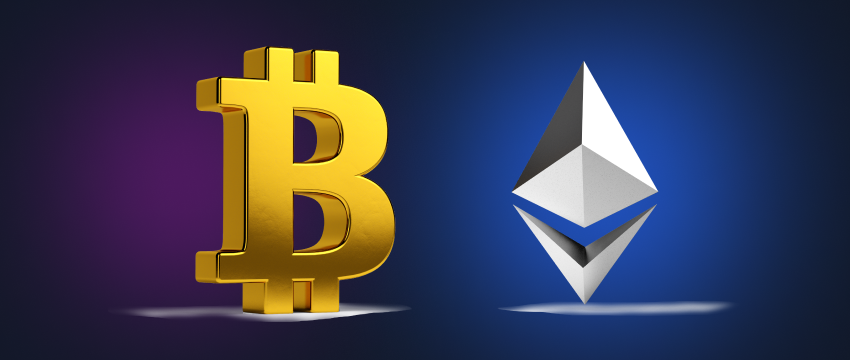Cryptocurrencies are digital currencies that are protected by cryptography to secure transactions. They are typically a decentralised digital asset founded on blockchain technology, and essentially immune from governmental control or manipulation. Crypto can be used to purchase all manner of goods or services but most people purchase cryptocurrencies as a form of investment, like stocks or metals.

Bitcoin and other popular cryptocurrencies
Bitcoin was the world’s first decentralised cryptocurrency designed as a method of payment, with no third-party involvement in the transaction required. Introduced in 2009, Bitcoin remains the most popular cryptocurrency globally today. It has also been the catalyst for the emergence of other prominent digital currencies such as:
- Ethereum. Launched in 2015, Ethereum is a decentralised, community-run software platform, with smart contract and dApp capabilities. The native cryptocurrency of the platform is called Ether.
- Litecoin. Emerging in 2011, Litecoin is the second oldest cryptocurrency. Its supply has been designed to reduce over time to retain the digital currency’s value. In fact, there are reportedly a little less than 11 million Litecoin left to mine as of June 2023.
- Cardano. The first blockchain software platform built using scientific methods (Ouroboros proof-of-stake consensus protocol. Cardano aims to use technology to achieve a sustainable global society, without the interference of intermediaries, offering a new framework for the way we work, interact, and create.
- Ripple. A digital payment system and protocol similar to the SWIFT system, designed to process transactions globally. XRP is Ripple’s cryptocurrency token.
- Solana. Founded in 2017, Solana is another blockchain platform that’s been said to process transactions much faster and charge lower transaction fees in comparison to other rivals like Ethereum. It uses the ticker symbol SOL.
- Dogecoin. Often referred to as the first “meme coin”, Dogecoin is an open-source peer-to-peer digital currency much like Bitcoin and Ethereum. It features as its logo a Shiba Inu, a Japanese breed of dog. Dogecoin is notable for its low price and limitless supply.
- Monero. A cyptocurrency that uses a blockchain with private-enhancing technologies to ensure transactions retain anonymity and fungibility.

Advantages of using cryptocurrencies
Cryptocurrencies continue to gain popularity globally for several different reasons. Let’s discuss some of them.
Cost to transact
Cryptocurrencies enable the transfer of funds worldwide, with no need for third parties to confirm the transactions. As a result, transaction fees are minimal or zero.
Decentralised
The decentralised nature of cryptocurrencies makes them immune to governmental interference, and thus free from any centralised form of control.
Easy to access
Cryptocurrencies can be accessed by virtually anyone with a computer or mobile phone, and internet connectivity. Opening a crypto wallet is incredibly easy, with no verification criteria in place (i.e., no ID, credit, background check, etc., required). This streamlines the process of sending funds significantly.
Transaction speed
Unlike conventional banking transactions which may take 1-5 days, cryptocurrency transactions are considerably faster, handled in a matter of minutes. This level of speed is what attracts so many crypto enthusiasts or investors.
Diversification
Cryptocurrencies can be used as a means to diversify one’s investment portfolio. However, having proper risk management measures in place is crucial due to the volatility of the cryptocurrency space.
Sécurité des fonds
Cryptocurrency transactions are renowned for the level of security they offer. This is due to the usage of public and private keys, proof of work, proof of stake, and other safety measures. Further, funds in one’s crypto wallet are considered inaccessible unless the crypto wallet’s private key is exposed.
Privacy
Without the need to disclose personal details or third-party intervention, investors have an unprecedented level of privacy. Monero has elevated the notion of anonymity as well.
Transparence
Crypto enthusiasts and investors are drawn to the crypto space for the level of transparency and openness it offers. This is made possible by the decentralised nature of the blockchain. Having the ability to monitor transactions creates a sense of openness and eliminates corruption to a large degree.
Currency exchange
Traditional currencies like the US Dollar or the Euro can be used to purchase cryptocurrencies. Further, investors can engage in crypto trading and convert currencies using wallets or cryptocurrency exchanges, incurring low transaction fees.
Downsides of using cryptocurrencies
While obvious advantages exist in using cryptocurrencies, there are disadvantages associated with their usage as well.
Criminal activity
Cryptocurrencies have earned a dubious reputation from time to time for their role in criminal activities like money laundering, drug dealing, and other illegal purchases. They have also been used by hackers in ransomware attacks.
Hacking
While cryptocurrencies are reportedly highly secure, crypto wallets and exchanges are susceptible to hacking. Such cases have occurred over the last several years, resulting in the theft of millions of dollars worth of coins.
Price volatility
Traders who engage in cryptocurrency trading in financial markets must know how to handle the price volatilities that exist. The dramatic rise and fall of prices can result in massive losses if not properly managed.

A digital trail
While crypto users have some semblance of anonymity, the use of a pseudonym still leaves a digital trail that may be decoded and traced.
Regulatory oversight
The decentralisation of cryptocurrencies raises various legal issues worldwide. This includes jurisdictional challenges, privacy concerns, tax implications, IP infringements, legal recourse, etc.
Energy consumption
Mining of cryptocurrencies requires mammoth amounts of energy, sometimes as much as entire countries use. In fact, Bitcoin is said to consume 127 TWh annually, more than countries like Norway. In the US, crypto activity is apparently responsible for 25-50 million tons of carbon emissions yearly. This has made the move to decarbonising the crypto industry incredibly vital.
En conclusion
Crypto investors are advised to learn as much as possible about the risks involved in crypto trading or investment. While benefits exist in engaging in the crypto space, there are many drawbacks that must be considered as well. Risk management is key, as is ongoing learning and monitoring of the markets.
CLAUSE DE NON-RESPONSABILITÉ : Ces informations ne doivent pas être considérées comme un conseil ou une recommandation d'investissement, mais uniquement comme une communication marketing




